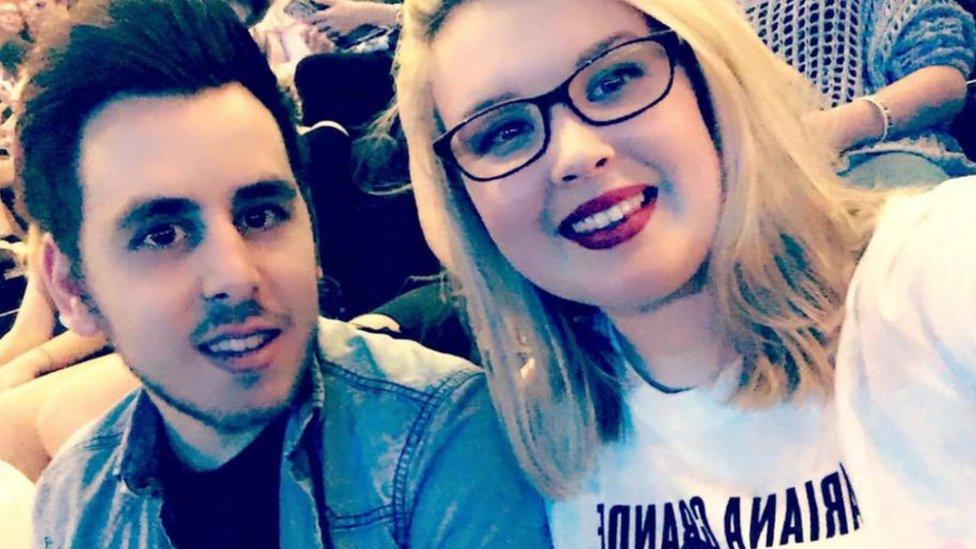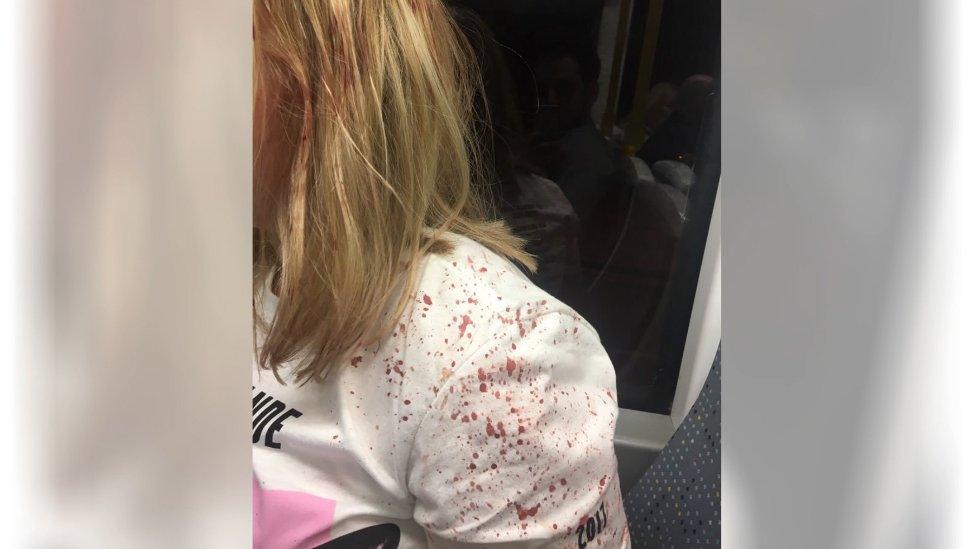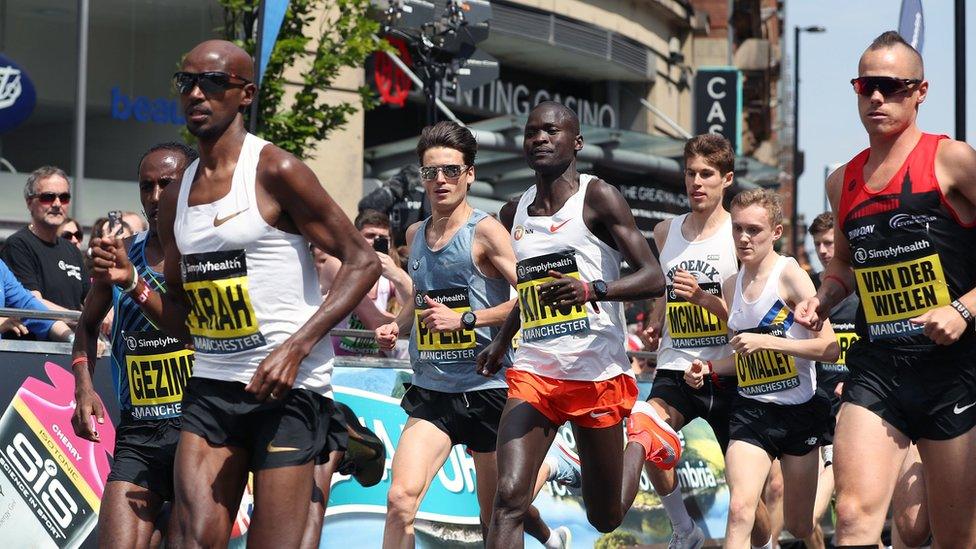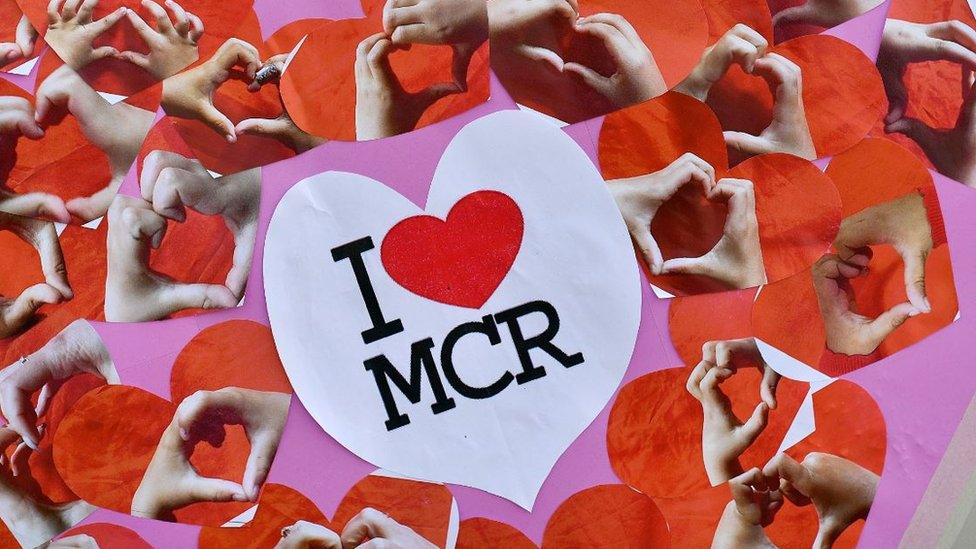Manchester attack witness: 'I can still see it in slow motion'
- Published
'The anxiety started to build up after attack'
An Edinburgh woman who witnessed last year's terror attack in Manchester has spoken out about what she says is a lack of support following the bombing.
It comes ahead of the one year anniversary of the arena attack in which 23 people were killed.
Alex Brown said she had struggled to get help through the health service after being diagnosed with PTSD.
NHS Lothian has urged her to get in touch directly with them in order to address her concerns.
Warning: This article contains a graphic description and image
Ms Brown, 21, and her boyfriend Chris Coulter were caught by the blast and saw its aftermath.
They had been in Manchester to celebrate the end of her third year accountancy exams at Heriot Watt University.

As they were leaving the venue after the concert they were hit by the blast and Mr Coulter was hit by the head and torso of the suicide bomber as he blew himself up.
They were given no support in the immediate aftermath of the bombing, at the venue, or at the hotel.
They contacted police and authorities after but there was a mix-up and no-one got back to them to take statement or offer support.
Ms Brown told BBC Scotland: "It was a bit of a blur really, but I can still see it in slow motion.
"I can tell every single detail of what I saw.
"I have had to come to terms with it all and it's still difficult to think about it.
"But it is what it is, I guess."
Asked how the attack had affected her life, Ms Brown said: "I just completely changed, I think.
"I have lost a lot of friends. People didn't know what to say or want to say anything.
"I have been diagnosed with PTSD (post traumatic stress disorder).
"My sleep was a big problem. I did not sleep for two weeks...because it all sort of just hit me.
"I had to come to terms with that and find a way to overcome it."
'We weren't important enough'
She said the couple felt doubly traumatised by being made to feel they were not important.
They eventually contacted police because they felt their evidence may be relevant to the inquiry.
She said: "Because our clothes had been contaminated, we thought police might want these.
"We had given statements the following week, but unfortunately we did not hear anything for three months because there was a bit of a mix-up.
"We still very much experienced it and felt like we deserved to find out what was happening.
"That is all sorted but it was like a second trauma because we just felt like we weren't important enough."
She said care and support had been lacking for the couple.
She added: "There doesn't seem to be the NHS support. There doesn't seem to be any sort of counselling support.
"And if there is, there's a six to twelve month waiting list to get anything.
"Luckily, through university, I was able to start counselling in the July."
'Still struggling'
Asked how she feels a year on after the attack, she said: "I've come to terms with it - but it's still more of the aftermath of how it's been dealt with that has been quite difficult.
"I think more awareness needs to be raised.
"We are still struggling. It's difficult - we are far away from Manchester and we are not involved in all of that.
"I am going to finish university and I have got a job in the field that I want to be in.
"I am positive that I will get there in the end.
"I have had to take a little longer than other people but I am still going to get there."

Alex Brown's T-shirt was covered in blood from the blast at the Manchester Arena
Ms Brown was able to get counselling three months later through her university but Mr Coulter has been told he is not eligible for support.
They have been back at concerts but Ms Brown said leaving the venues is always hard. They want more recognition and support for the mental health of those caught up in trauma.
NHS Lothian said it had services in place to help people and urged Ms Brown to get in touch.
Dr Tracey Gillies, Medical Director, NHS Lothian, said: "NHS Lothian operates the Rivers Centre in Edinburgh, which is a leading specialist service for people of all ages who have been affected by psychological trauma.
"The team regularly liaises with resilience teams and in the aftermath of major incidents to provide support.
"The Rivers Centre is a self-referral service, so people over the age of 18 do not require a referral from their GP, but can access the service directly through a dedicated Advice Clinic."
She added: "Alternatively patients can be referred by their GP into general mental health services for an appointment with a specialist.
"We do not know the circumstances involved in this case and we could not breach a patient's confidentiality by discussing details, but I would urge the patient to get in touch so that we could discuss their concerns with them directly."
- Published20 May 2018

- Published28 February 2018
